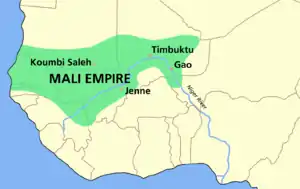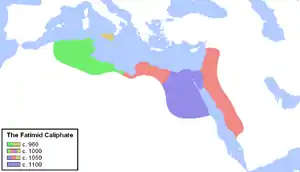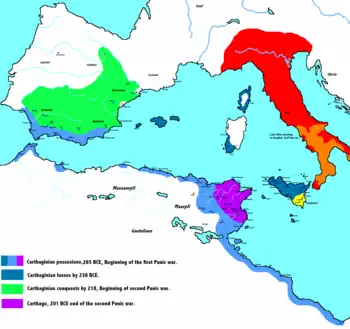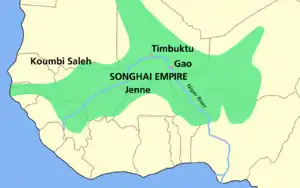Portal:Africa


.svg.png.webp)
Africa is the world's second-largest and second-most populous continent, after Asia in both aspects. At about 30.3 million km2 (11.7 million square miles) including adjacent islands, it covers 20% of Earth's land area and 6% of its total surface area. With 1.4 billion people0 as of 2021, it accounts for about 18% of the world's human population. Africa's population is the youngest amongst all the continents; the median age in 2012 was 19.7, when the worldwide median age was 30.4. Despite a wide range of natural resources, Africa is the least wealthy continent per capita and second-least wealthy by total wealth, behind Oceania. Scholars have attributed this to different factors including geography, climate, tribalism, colonialism, the Cold War, neocolonialism, lack of democracy, and corruption. Despite this low concentration of wealth, recent economic expansion and the large and young population make Africa an important economic market in the broader global context.
Africa straddles the equator and the prime meridian. It is the only continent to stretch from the northern temperate to the southern temperate zones. The majority of the continent and its countries are in the Northern Hemisphere, with a substantial portion and number of countries in the Southern Hemisphere. Most of the continent lies in the tropics, except for a large part of Western Sahara, Algeria, Libya and Egypt, the northern tip of Mauritania, and the entire territories of Morocco, Ceuta, Melilla, and Tunisia which in turn are located above the tropic of Cancer, in the northern temperate zone. In the other extreme of the continent, southern Namibia, southern Botswana, great parts of South Africa, the entire territories of Lesotho and Eswatini and the southern tips of Mozambique and Madagascar are located below the tropic of Capricorn, in the southern temperate zone.
Africa is highly biodiverse; it is the continent with the largest number of megafauna species, as it was least affected by the extinction of the Pleistocene megafauna. However, Africa also is heavily affected by a wide range of environmental issues, including desertification, deforestation, water scarcity and pollution. These entrenched environmental concerns are expected to worsen as climate change impacts Africa. The UN Intergovernmental Panel on Climate Change has identified Africa as the continent most vulnerable to climate change.
The history of Africa is long, complex, and has often been under-appreciated by the global historical community. Africa, particularly Eastern Africa, is widely accepted as the place of origin of humans and the Hominidae clade (great apes). The earliest hominids and their ancestors have been dated to around 7 million years ago, including Sahelanthropus tchadensis, Australopithecus africanus, A. afarensis, Homo erectus, H. habilis and H. ergaster—the earliest Homo sapiens (modern human) remains, found in Ethiopia, South Africa, and Morocco, date to circa 233,000, 259,000, and 300,000 years ago, respectively, and Homo sapiens is believed to have originated in Africa around 350,000–260,000 years ago. Africa is also considered by anthropologists to be the most genetically diverse continent as a result of being the longest inhabited. (Full article...)
Selected article –

Lalibela (Amharic: ላሊበላ) is a town in the Amhara Region of Ethiopia. Located in the Lasta district and North Wollo Zone, it is a tourist site for its famous rock-cut monolithic churches. The whole of Lalibela is a large and important site for the antiquity, medieval, and post-medieval civilization of Ethiopia. To Christians, Lalibela is one of Ethiopia's holiest cities, and a center of pilgrimage.
Ethiopia was one of the earliest nations to adopt Christianity in the first half of the 4th century, and its historical roots date to the time of the Apostles. The churches themselves date from the 7th to 13th centuries, and are traditionally dated to the reign of the Zagwe (Agaw) king Gebre Mesqel Lalibela (r. ca. 1181–1221). (Full article...)Featured pictures –
Did you know –
- ...that from 1926 to 1940, the Union Minière du Haut Katanga had a virtual monopoly of the world uranium market?
- ...that Anfillo is an endangered language of Western Ethiopia, spoken only by a few hundred adults above sixty?
- ...that Bono Manso, the capital of Bono state, was an ancient Akan trading town in present-day Ghana, which was frequented by caravans from Djenné as part of the Trans-Saharan trade?
- ...that Reverend John Chilembwe is celebrated as the first Malawian nationalist, and was a martyr for his cause?
Categories
Selected biography –
Usman Ɗan Fodio pronunciation (Arabic: عثمان بن فودي, romanized: ʿUthmān ibn Fodio; 15 December 1754 – 20 April 1817) was a Fulani scholar, Islamic religious teacher, revolutionary and a philosopher who founded the Sokoto Caliphate and ruled as its first caliph. After the successful revolution, he "Jama'a" gave him the title Amir al-Mu'minin (commander of the faithful). He rejected the throne and continue calling to Islam.
Born in Gobir, Usman was a descendant the Torodbe clans of urbanized ethnic Fulani people living in the Hausa Kingdoms since the early 1400s. In early life, Usman became well educated in Islamic studies and soon, he began to preach Sunni Islam throughout Nigeria and Cameroon. He wrote more than a hundred books concerning religion, government, culture and society. He developed a critique of existing African Muslim elites for what he saw as their greed, paganism, violation of the standards of the Sharia. (Full article...)Selected country –
 Flag of the Gabonese Republic |
 Coat of Arms of the Gabonese Republic |
|
 | ||
Gabon, or the Gabonese Republic, is a country in west central Africa. It borders on Equatorial Guinea, Cameroon, the Republic of the Congo and the Gulf of Guinea. Since its independence from France on August 17, 1960, the Republic has been ruled by only two autocratic presidents; the incumbent El Hadj Omar Bongo Ondimba has been in power since 1967 and is currently Africa's longest-serving head of state. Gabon introduced a multiparty system and a new democratic constitution in the early 1990s that allowed for a more transparent electoral process and for reforms of governmental institutions.
Gabon has at least forty ethnic groups with separate languages and cultures, of which the Fang are generally thought to be the largest. A small population, abundant natural resources (including offshore petroleum reserves), and foreign private investment have helped make Gabon one of the most prosperous countries in the region, with a per capita income of four times the average for Sub-Saharan Africa, although the distribution of income from this industry is extremely unequal. (Read more...)
Selected city –
 Constantine |
Constantine (Arabic: قسنطينة, romanized: Qusanṭīnah), also spelled Qacentina or Kasantina, is the capital of Constantine Province in northeastern Algeria. During Roman times it was called Cirta and was renamed "Constantina" in honor of emperor Constantine the Great. It was the capital of the French department of Constantine until 1962. Located somewhat inland, Constantine is about 80 kilometres (50 miles) from the Mediterranean coast, on the banks of the Rhumel River.
Constantine is regarded as the capital of eastern Algeria and the commercial center of its region, and it has a population of about 450,000 (938,475 with the agglomeration), making it the third largest city in the country after Algiers and Oran. There are several museums and historical sites located around the city. Constantine is often referred to as the "City of Bridges" due to the numerous picturesque bridges connecting the various hills, valleys, and ravines that the city is built on and around. (Full article...)In the news
- 19 March 2022 – Politics of Australia
- Preliminary election results show Peter Malinauskas and his Labor Party winning a majority. (ABC News Australia)
- 15 March 2022 –
- Burkinabè architect Diébédo Francis Kéré wins the 2022 Pritzker Architecture Prize, becoming the first African and black person to do so. (The Guardian)
- 15 March 2022 – COVID-19 pandemic
- COVID-19 pandemic in Namibia
- Namibia drops its requirement of face mask and mandatory PCR COVID-19 test for vaccinated visitors as the number of cases falls. (Reuters)
- 14 March 2022 –
- Cameroon bans shisha smoking, becoming the sixth African country to do so. (Africanews)
- 13 March 2022 – Insurgency in Northern Chad; aftermath of the 2021 Northern Chad offensive
- The Transitional Military Council of Chad meets with 44 different armed rebel and opposition groups, including the Front for Change and Concord in Chad, Movement for Democracy and Justice in Chad, and the Union of Forces for Democracy and Development in Doha, Qatar for peace talks. The President of Chad, Mahamat Déby, hopes that the talks will be the first step towards agreeing on a new constitution and holding free elections. (ABC News) (France24)
Updated: 7:33, 20 March 2022
General images -
Africa topics
Related portals
Associated Wikimedia
The following Wikimedia Foundation sister projects provide more on this subject:
-
 Commons
Commons
Free media repository -
 Wikibooks
Wikibooks
Free textbooks and manuals -
 Wikidata
Wikidata
Free knowledge base -
 Wikinews
Wikinews
Free-content news -
 Wikiquote
Wikiquote
Collection of quotations -
 Wikisource
Wikisource
Free-content library -
 Wikispecies
Wikispecies
Directory of species -
 Wikiversity
Wikiversity
Free learning tools -
 Wikivoyage
Wikivoyage
Free travel guide -
 Wiktionary
Wiktionary
Dictionary and thesaurus
More portals
-
 List of all portalsList of all portals
List of all portalsList of all portals -
 The arts portal
The arts portal -
 Biography portal
Biography portal -
 Current events portal
Current events portal -
 Geography portal
Geography portal -
 History portal
History portal -
 Mathematics portal
Mathematics portal -
 Science portal
Science portal -
 Society portal
Society portal -
 Technology portal
Technology portal -
 Random portalRandom portal
Random portalRandom portal -
 WikiProject PortalsWikiProject Portals
WikiProject PortalsWikiProject Portals







.jpg.webp)
_adult_male.jpg.webp)
.jpg.webp)



.jpg.webp)
.jpg.webp)

















.jpg.webp)

_(14594947249).jpg.webp)

























.jpg.webp)
.jpg.webp)










.jpg.webp)































.jpg.webp)







